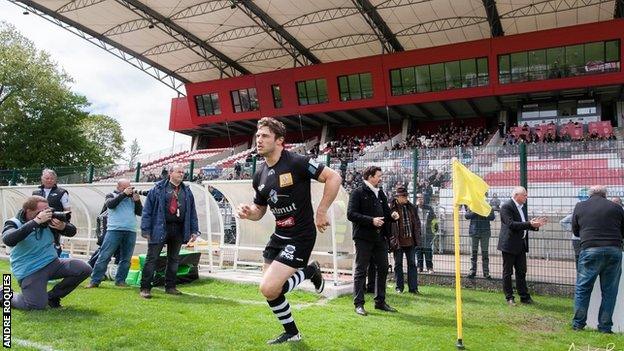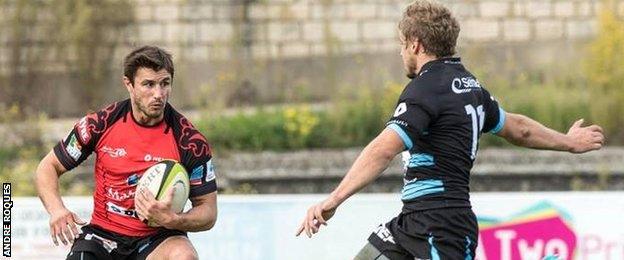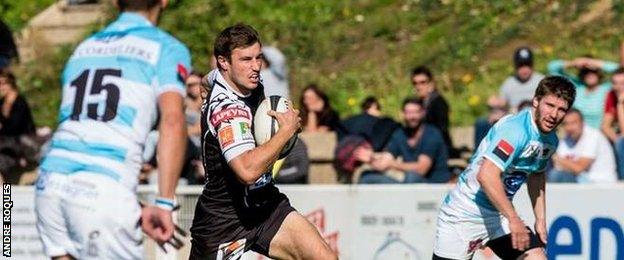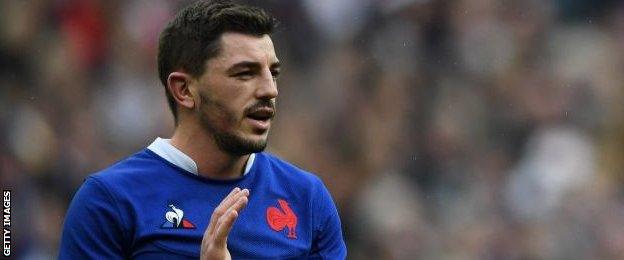What's French club rugby really like? Ben Mercer reveals all
- Published

Mercer spent four seasons with Rouen in France
England has more players. New Zealand have more success. South Africa has a more complex relationship with the sport.
But nowhere has a rugby culture quite like France.
In 2016, a world-record crowd of more than 99,000, external watched Racing 92 win the Top 14 final at Barcelona's Nou Camp.
Three years before, 50,000 people, about one in three of the city's population, thronged Toulon's port as their team celebrated a maiden Champions Cup.
And all around the country, in tiny towns and villages, you will find a set of posts and a team ready to defend their honour.
Back in 1999, a 12-year-old Ben Mercer watched his home town team Bath beaten by a swaggering Toulouse and was fascinated.
Clearly he is not the only one.
His book detailing his four seasons playing with lower-league Rouen - Fringes: Life on the Edge of Professional Rugby - tops the sport's bestseller charts ahead of autobiographies by Sam Warburton, Warren Gatland and Eddie Jones., external
These are some of the lessons that Mercer, who also played for Cornish Pirates, Plymouth Albion, Bristol and Blaydon, learned across the Channel.

Mercer's brother Guy played for Bath, who Ben represented at junior level
The good...
The national team's champagne rugby may have lost some fizz, but is there still a maverick streak running through the French game?
"Rouen were in the fourth tier of French rugby when I arrived and the quality of the opposition was very variable," remembers Mercer.
"But it didn't matter if they were good or bad, each team could have 10 minutes when they would be flinging offloads and everything would stick.
"You could be playing a terrible team and suddenly they would be like the Barbarians.
"If they are losing, they would either make no effort at all or throw everything to the wall and go 'full French'. If it came off, it was irresistible."
The tactics varied depending on venue though, with home matches coming with an obligation to put on a show.
"At home, you are defending your town. It is a big theme in the dressing room pre-match and you have the freedom to try and break the game. But away, there is little expectation you are going to win. Or that the referee will call the game correctly.
"So tactics for away matches are very conservative. We would go into damage limitation mode. Some of the people who would be yelling in the team talk at home, would just quietly strap up and jog out."

Mercer self-published his memoirs after four years in France
...the bad...
Sebastien Vahaamahina's elbow and Mohamed Haouas' fist might have cost France their chances at last year's Rugby World Cup and this year's Six Nations respectively. French club rugby has a reputation for things going similarly south on the disciplinary front.
"It's definitely worse," says Mercer when he compares the level of violence in the game to that in England.
"I remember an away game in Paris where I nudged a full-back after chasing a high ball and he turned round and punched me full in the face.
"The ref blew up and I was thinking he would be off and we would be a man up, but instead it was 'calm down, scrum down, home ball'.
"All the matches were filmed but the cameraman would turn the camera away if a punch-up broke out so that nobody would be punished too severely at a later date."
There was one particular piece of foul play that is still deployed.
"During my years playing in England I got eye-gouged only once," said Mercer.
"In France though it happened quite regularly. While in the UK it is culturally unacceptable now, there some of the older guys especially would kind of chuckle about it."
...and the culinary
Rather than the protein and steamed vegetable staple he was used to in England, Mercer found Rouen's priorities were pleasure over musculature.
"Diet is not a consideration for most of the players I was with," he said.
"They are very into eating proper meals - but are not really interested in the nutrition behind it. Why shouldn't it be confit de canard [roast duck, preserved in goosefat]?
"Every lunchtime would be a three-course meal with a little starter, a big main followed up with a little compote or some gateau.
"It extended to alcohol as well. We had a training camp where some of the boys had pints with lunch and then headed back out onto the pitch.
"If you were at a sponsors' event it would be considered rude and obstructive to not have a drink.
"The top line was that if you were playing well, nobody cared about your strength and conditioning."
Upwardly mobile

Bouthier only moved into the Top 14 at the start of this season with a move to Montpellier
During this year's Six Nations, Mercer did a double take to see Anthony Bouthier line up for France.
Five years before, Bouthier had been on an opposing team in the third tier of French club rugby.
"We had played away at Vannes and I remember him jogging past our fly-half for a try," Mercer said.
"He looked a pretty tidy player but then so did their fly-half, who has not gone on to play at the top level.
"There seems to be more mobility of talent between the divisions. There are certainly a few of my former team-mates from Rouen in the Top 14, one of whom, Wilfrid Hounkpatin, was called up to the French squad as well this year."